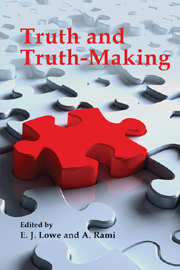Book contents
- Frontmatter
- Contents
- Preface
- Contributors
- 1 Introduction: truth and truth-making
- Part I Setting the stage
- 2 Truth and the truth-maker principle in 1921
- 3 Truth-makers
- 4 Truth-makers, entailment and necessity
- 5 Postscript to “Truth-makers, entailment and necessity”
- 6 Truth-making and difference-making
- 7 The general theory of truth-making
- Part II The current debate
- Bibliography
- Index
5 - Postscript to “Truth-makers, entailment and necessity”
from Part I - Setting the stage
- Frontmatter
- Contents
- Preface
- Contributors
- 1 Introduction: truth and truth-making
- Part I Setting the stage
- 2 Truth and the truth-maker principle in 1921
- 3 Truth-makers
- 4 Truth-makers, entailment and necessity
- 5 Postscript to “Truth-makers, entailment and necessity”
- 6 Truth-making and difference-making
- 7 The general theory of truth-making
- Part II The current debate
- Bibliography
- Index
Summary
It is twelve years since the publication of “Truth-makers, entailment and necessity”, and some of my views on the topics discussed have changed in that time. More recent work on truth-making (in particular, Lewis's “Truth-making and difference-making”, this vol., Ch. 6) has convinced me that the idea that truth depends on ontology can be captured in a number of different ways. Which ways we take to be most appealing will depend on a whole host of views or commitments, not the least being those concerning what different kinds of things there are.
Elsewhere I have shown that the robust picture of truth-making in “Truthmakers, entailment and necessity” can apply in a very simple “world” in which the truth-makers are regions in which atoms are either present or not (Restall 2000). No strange “negative” or “universal” facts need to be added to that picture; regions together with their inhabitants can suffice, so worries about the queerness of “negative” or “universal” facts need not worry the friend of robust truthmaking if the metaphysics is kind enough to supply everyday objects that do the job.
However, some of my views have changed more significantly, since 1996. I am now convinced by an argument of Stephen Read, in “Truthmakers and the Disjunction Thesis” (2000) that the “or and shmor” argument in §3 of “Truthmakers, Entailment and Necessity” is too swift. In the rest of this note, I will give an account of Read's concern, and then chart four possible responses to it from the perspective of one who wishes to maintain the broad outline of the position of “Truth-makers, entailment and necessity”.
Information
- Type
- Chapter
- Information
- Truth and Truth-Making , pp. 98 - 101Publisher: Acumen PublishingPrint publication year: 2008
